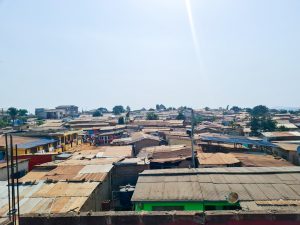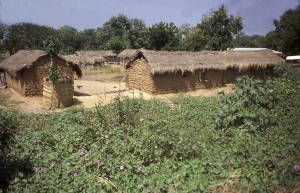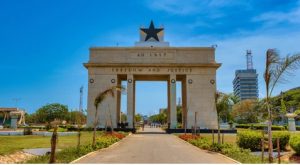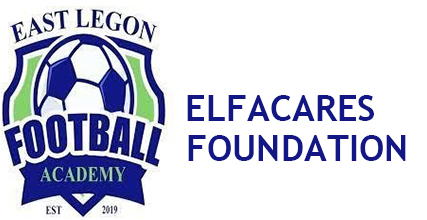Where We Serve
The Anumle Electoral Area
 The Anumle Electoral Area, situated within the Greater Accra region of Ghana, is characterized as an urban area encompassing six communities. Despite being in close proximity to notable institutions such as the Ghana Forestry Department, University of Ghana, Achimota Golf Club, Achimota School, and Ghana Institute of Management and Public Administration (GIMPA), the residents of the Anumle Electoral Area do not benefit from these institutions.
The Anumle Electoral Area, situated within the Greater Accra region of Ghana, is characterized as an urban area encompassing six communities. Despite being in close proximity to notable institutions such as the Ghana Forestry Department, University of Ghana, Achimota Golf Club, Achimota School, and Ghana Institute of Management and Public Administration (GIMPA), the residents of the Anumle Electoral Area do not benefit from these institutions.
With a population of approximately 11,500 people, including 5,000 children aged 5 to 18, this area is designated as a slum or inner city. The community grapples with numerous challenges, including high levels of unemployment, low income, limited educational opportunities, inadequate infrastructure and services, poverty, pollution, overcrowding, congestion, and a shortage of affordable housing.
These conditions contribute to an increased risk of diseases. Child neglect and labor are prevalent, with children often shouldering the responsibility of self-care and, in many instances, caring for their siblings and parents. Disturbingly, mothers sometimes compel their daughters to engage in prostitution for financial gain.
The area also witnesses an influx of foreign teenagers brought to Ghana by exploitative masters, engaging in inhumane activities for monetary gain. This negative influence adversely affects other children in the community who may be inclined to emulate these behaviors. Many of the children served by our organization are first-generation readers or literates, highlighting the urgent need for comprehensive support and intervention in this challenging urban setting.
The Kpoviadzi Electoral Area
 The Kpoviadzi Electoral Area, situated in the Central Tongu Constituency of the Volta Region in Ghana, encompasses eight small rural communities with a total population of approximately 2,500 residents, of which 600 are children aged 5 to 18.
The Kpoviadzi Electoral Area, situated in the Central Tongu Constituency of the Volta Region in Ghana, encompasses eight small rural communities with a total population of approximately 2,500 residents, of which 600 are children aged 5 to 18.
The area encounters significant health-related challenges, including limited healthcare facilities, inadequate road infrastructure, and insufficient health information dissemination, hindering access to medical care and facilities. Furthermore, issues such as a scarcity of running water, limited economic opportunities, inadequate electricity supply, and insufficient toilet facilities compound the challenges faced by rural communities in area.
The majority of residents are small-scale farmers, with a limited number engaged in trade and manual labor. Child labor is prevalent as children often assist their parents on farms, impacting their educational priorities. While completion of junior high school is encouraged, financial constraints impede most children from pursuing senior high school education.
Consequently, many turn to farming at an early age or migrate to larger towns in search of employment. The prevalence of stunting (chronic malnutrition or low height-for-age) is notably high, reaching 33 percent in the Kpoviadzi Electoral Area compared to the national average of 19 percent. Teenage pregnancy is also common due to limited engagement of children and youth, coupled with cultural and religious norms discouraging the use of contraceptive pills.
Project Ghana
 Subject to funding availability or sponsorship, the Elfacares Foundation Organization annually conducts the Coach the Coaches Course and the Soccer Clinic Project concurrently, typically spanning one to two months, predominantly in July and August. These initiatives involve touring various regions to implement the projects.
Subject to funding availability or sponsorship, the Elfacares Foundation Organization annually conducts the Coach the Coaches Course and the Soccer Clinic Project concurrently, typically spanning one to two months, predominantly in July and August. These initiatives involve touring various regions to implement the projects.
The Coach the Coaches Course focuses on training soccer coaches to become agents of change and advocates within their communities through soccer. Qualified soccer coaches and social workers collaborate for a week-long training program. Successful course participants receive certificates, soccer equipment, and jerseys, committing to implementing a project in their community.
Simultaneously, the Elfacares Foundation Organization organizes soccer clinics that employ engaging soccer drills to introduce the game to children, especially girls and minority communities. These clinics promote physical activity, inclusivity, and unity.
Participants receive jerseys and soccer balls to sustain their engagement in fun and physical activities after the program concludes. Importantly, children involved in the program are recruited by coaches who have undergone the Coach the Coaches Course, creating a sustainable and interconnected impact.
Thank you for reading!
